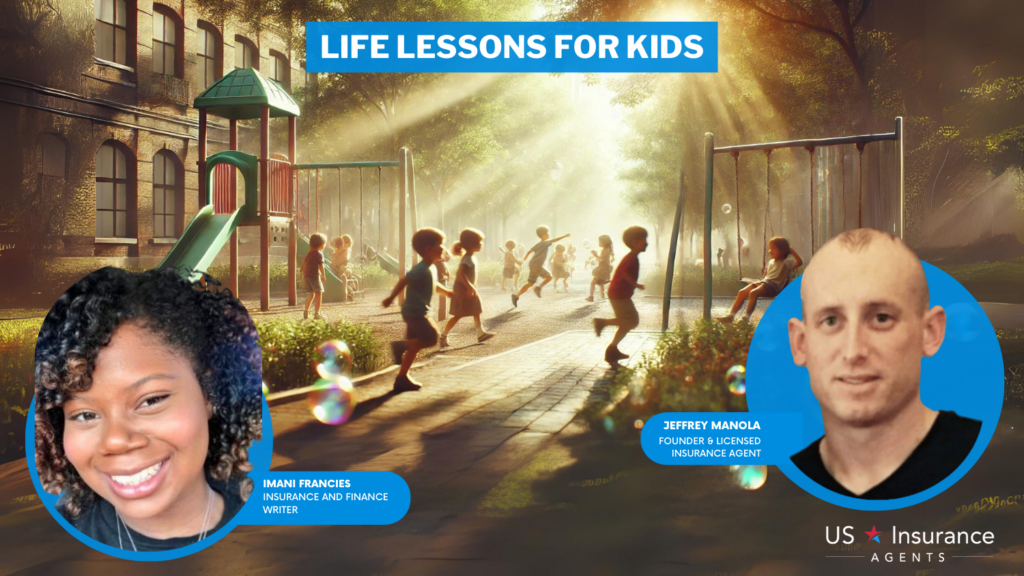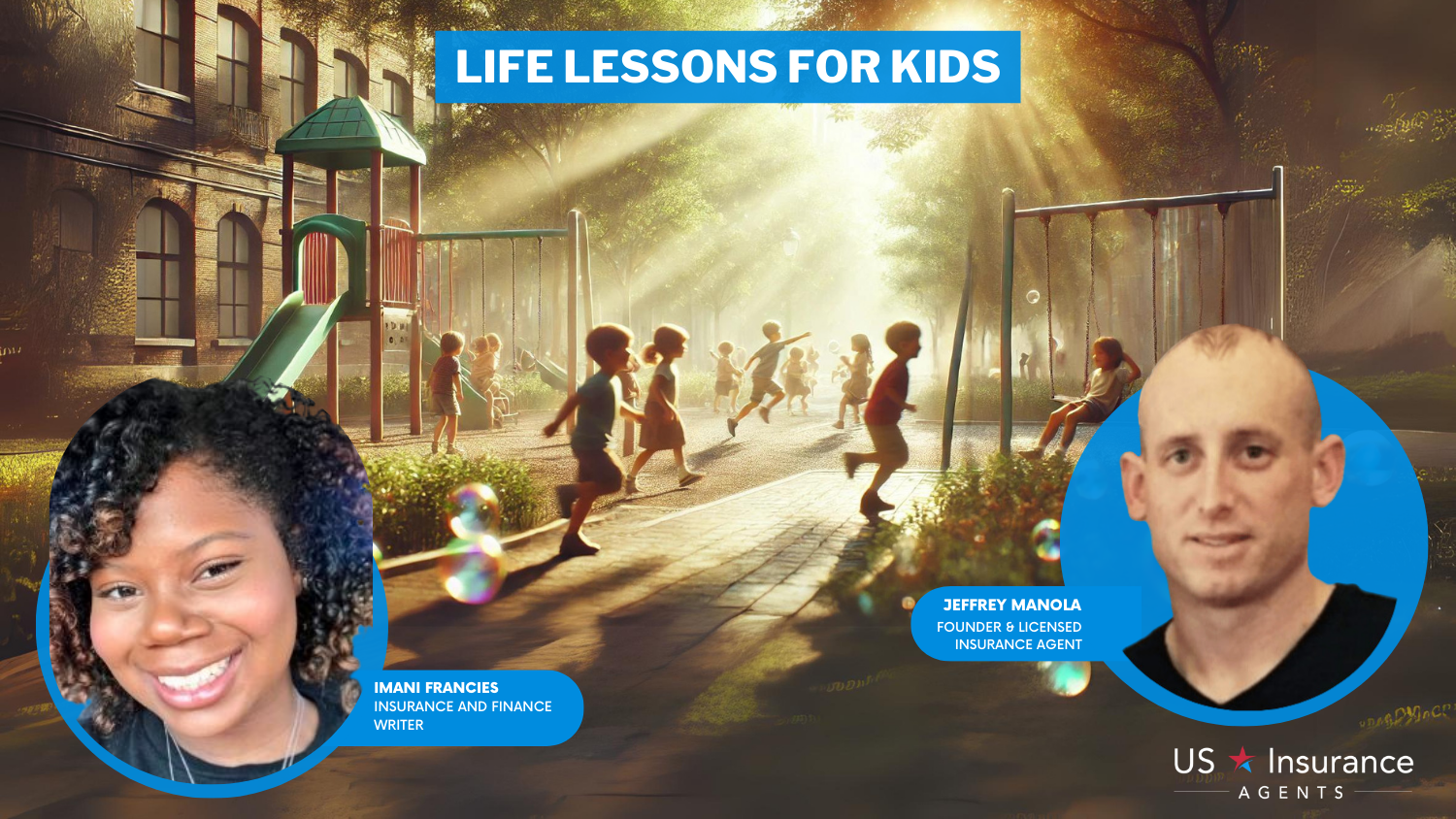Life Lessons for Kids
Discover the power of life lessons for kids: equipping them with essential knowledge to navigate life's uncertainties and make informed decisions. Our comprehensive insurance information offers insights and guidance to help protect your child's future. Empower your children to understand the importance of financial security and instill responsible habits from an early age.
Read more Secured with SHA-256 Encryption





Table of Contents
Table of Contents


Insurance and Finance Writer
Imani Francies is a finance and insurance writer who has strong media and communication skills with a bachelor's degree from Georgia State University. She began her writing career freelancing with various blogs and internships while working full-time as an early childhood educator. She has significant experience in both print and online media as a writer, editor, and author. She works efficient...
Imani Francies


Sr. Director of Content
Sara Routhier, Senior Director of Content, has professional experience as an educator, SEO specialist, and content marketer. She has over 10 years of experience in the insurance industry. As a researcher, data nerd, writer, and editor, she strives to curate educational, enlightening articles that provide you with the must-know facts and best-kept secrets within the overwhelming world of insurance....
Sara Routhier


Licensed Insurance Agent
Jeffrey Manola is an experienced life insurance agent who founded TopQuoteLifeInsurance.com and NoMedicalExamQuotes.com. His mission when creating these sites was to provide online consumers searching for life insurance with the most affordable term life insurance, permanent life insurance, no medical exam life insurance, and burial insurance. Not only does he strive to provide consumers with t...
Jeffrey Manola
Updated October 2024
Welcome to our comprehensive guide on life lessons for kids, where we explore the crucial values and skills that lay the foundation for a successful and fulfilling life.

We delve into various key topics, including teaching children the importance of empathy, resilience, responsibility, and self-confidence. By instilling these invaluable life lessons at an early age, we empower our children to navigate the challenges of adulthood.
As parents, caregivers, or educators, it is our responsibility to equip the younger generation with the tools they need to thrive. To ensure your child’s future is protected in every aspect, including their financial well-being, take the first step by entering your zip code below. Compare rates from the best insurance providers and safeguard their future today.
Never Give Up
Sometimes, things like sports or math class can seem almost impossible. No matter how hard things get, it is important to remember to never give up. If at first you do not succeed, you should always keep trying. If you work really hard at something, you can achieve your goals. Remember that no one ever accomplished their dreams by giving up! If you feel like you need support, turn to a friend or parent for help and advice, but hang in there and you will see the benefits of sticking to your goals!
- Don’t Give up Your Dreams – Read how one astronaut encourages kids to stay on track and never give up.
- These Kids Never, Never, Never Give Up – Discover children books that remind us all not to give up.
Integrity
What does integrity mean? It means that you have values and morals, and you stick to those values and morals in how you treat others. Peer pressure can be really hard to deal with sometimes, but if you have integrity, you know right from wrong and you stay with it. Integrity means you have strength of character and the ability to stand up for what is right.
- Strong Character: Integrity – Here’s how parents can help teach their kids the importance of integrity.
- Sports & Character – Discover how sports can help to teach kids character.
Forgiveness
Maybe your best friend has hurt your feelings, or you parent grounded you for something you feel is unfair. No matter what the reason, practicing forgiveness is very important. It is not always easy to forgive those who might have caused you to feel sad or upset, but it will make you feel much better about yourself. If you forgive someone, you can often move on with things and keep your friendships in place. Also, imagine if you had done something you really didn’t mean and felt bad about it. You’d want the person you hurt to forgive you, too.
- The Art of Forgiveness – Learn more about forgiveness and how you can learn to practice it in daily life.
- The Forgiveness Project – Discover how forgiveness has changed many peoples’ lives through these profiles and stories.
Welcome diversity
No two people are alike, and sometimes kids can shun others who are different. It’s diversity that makes the world such an interesting and amazing place. Whether it is the foreign exchange student or a kid from a different neighborhood, you should always be welcoming towards that person, and remember that we are all different on the outside, but we share the same basic things like family, friendships, and love. Welcoming diversity at school and in your life can open you up to a world of new learning adventures and new discoveries about yourself and others.
- Diversity Activities – Here are some lesson plans and activities kids can do to better understand diversity.
- What is Diversity? – Learn more about what diversity is and how it affects our life.
Respect
Sometimes, you might have a teacher or other adult in your life that you might not like to deal with. No matter how you feel, you should always show respect to others. Paying attention and not talking in class, saying yes mam or yes sir, and thanking others when they help you are all ways to show respect. Remember, if you show respect to others, you will get the same respect in return.
- Respect Games – Play these fun games to help you learn manners and respect.
- Respect Activities – Try these thirty five different activities to help you learn and practice respect.
Love and Trust yourself
While it is always important to love others, it is also important that you love yourself. Having a healthy self esteem and taking care of your own needs is very important. It is hard for us to love and trust others 100% if we don’t already do the same for ourselves. Having a healthy self image and a strong sense of self is essential in being a well rounded person. You can discover new things about yourself almost every day. Never be afraid to express yourself and show that you have self respect.
- The Story on Self-Esteem – Read more about self-esteem, what it means for you, and how to be a self-assured person.
- Building Self-Esteem – Here are several things parents and kids can do to build up self-esteem.
Play/Have fun
Don’t forget to play! Having fun is important and it helps us to feel less stressed in life. As kids, you should always set some time aside to play and enjoy life. Play a game, ride your bike, go roller skating, or do something fun outdoors. Playing is healthy and keeps our brains functioning and our minds creative. School is very important, but so is play time!
- Why Play Matters – This article explains why playing and having fun is important for kids and adults.
- Playing and Skills – This page explores how and why old fashioned playing can help kids build other skills.
Its ok to make mistakes
No one is perfect. This fact is very important to keep in mind if you make a mistake. It is ok to make mistakes sometimes, as long as you own up to it, be honest about the mistake, and then try to correct it if you can. Never hide a mistake. Most people understand when we make mistakes. If you do something wrong or make a mistake, just pick yourself up and dust yourself off and start all over again.
- Mistakes are Part of Learning – Remember, making mistakes can actually help you learn!
- To really learn, fail — then fail again! – Read about how making a few mistakes can teach very valuable lessons.
Tell the truth
Sometimes, telling the truth can be a bit embarrassing. Remember, honesty is always the best policy no matter what happens. Tell the truth about things that happen and you will not only feel much better, you will avoid having to cover things up with more lies later on. Being honest will benefit you in many facets of your life and help you to develop strong and trusting relationships with others.
- Honesty – This page will help you understand the basics of honesty and why it is so important.
- Teaching Honesty & Responsibility – A simple guide designed to help parents teach their children to be honest and responsible.
Be a Kid!
Even though life has its ups and downs, it’s important to remember to be a kid! You’re young and have so many different opportunities ahead of you. There is no rush to grow up. Enjoy having fun, being silly, reading good books, and watching fun movies. Being a kid while you’re still young is vital to a healthy adulthood. Have a good time, goof off, and don’t try to be too adult too soon!
- Kids & Physical Activity – Learn why it’s important for kids’ health to stay active and play!
- Easy Ways to Encourage Your Kids to Get Active – Check out activities, sports, and more to make sure kids stay active and have fun.
Love life
Life is precious. We should all respect our own life as well as the lives of others. Loving life makes it more enjoyable and fulfilling. Do different things, experience new places and foods, and enjoy your life as much as possible. Having fun is an essential part of loving life, so try to have fun no matter what you do.
- Music for Kids – Music is an important part of life! Here’s some fun music related resources geared towards children.
- The Top 10 Skills Children Learn From the Arts – The arts are integral in a happy life. Here are some skills that kids can learn from participating in the arts.
Life Choices for Healthier Kids
Health and fitness are best taught starting at a young age with the support of family, teachers and positive adult role models. Learning what it means to be healthy will help to instill positive and lasting habits, including what foods children learn to like and how they feel about their bodies. There are many resources available to help parents and teachers instill healthy habits into children, including how to eat healthy and have an active lifestyle.
Healthy Kids in the Kitchen
Getting kids excited about healthy food is essential when instilling positive eating habits. By introducing children to delicious and fun alternatives to overly processed and less nutrition snacks and foods, we can open there eyes to new flavors and help them see that healthy foods can be tasty and fun. Children may be more receptive to healthy foods when they are able to help in the kitchen and see where their foods come from. When preparing a healthy meal, have the children help with the cooking. There are so many age appropriate tasks that they can do to get involved and interested in cooking healthy meals; younger children can help pick vegetables from a backyard garden and stir ingredients, while older children can help chop and se the stove top and oven with the supervision of an adult. This also gives you the opportunity to talk to your kids about healthy foods by explaining the ingredients used in the meal. Encourage food exploration with healthy and fun recipes.
Fitness Plans, Games & Activities
Raising healthy, active kids is important not only for their physical wellbeing; it can also help them develop new skills, interests and encourage positive interaction with their peers. Setting goals as a group is important for overall health and fitness in a family or classroom. Talk to your kids and explain why it is important to stay active and set realistic fitness goals. There are so many different ways to stay active, there is something to meet everyone’s interests and fitness needs. To encourage kids to get up and get moving, facilitate different physical activities to engage all different interests; the more fun fitness can be, the more it will become second nature as the children grow. Organized and school sponsored sports and activities is a great way to get kids excited about fitness. Signing children up for a team sport also fosters sportsmanship and helps them to interact with their peers towards a common goal. Let your child explore different sports to see which one(s) they have an interest in. Encourage this interest by active participation, and you may find that your child’s interest starts a family trend. Tackling fitness concerns can be touchy, especially with pre-teen and teen children, but it does not have to be an uphill battle to a healthy body. As a family or a class, it is important to make an effort to get moving and have fun at the same time. Try different or less conventional methods of exercise to get less athletic children away from the computer or television and out into the backyard or playground. To encourage healthy activity, use the child’s interests as an advantage; get them moving by tying the physical activity into a subject they are passionate about. For example, if your child is interested in science, turn a hike into a nature walk and have them collect rocks, leaves, bugs, etc. along the way. For children who are a bit younger, send them on a “treasure hunt”, provide them with a list of items they need to collect along a walk in the woods. Geocaching, a location-based treasure hunting game, is also very kid-friendly activity to help get children excited about being outside and being active.
General Health & Fitness Resources
- USDA Health Eating Information
- Healthy Food Choices for Teens with Diabetes
- Teacher Tips: Cooking with Kids
- Help Your Kids Grow Up Healthy & Strong (PDF)
- Great Fitness and Exercise Websites for Kids
- Eat Smart. Play Hard. ™ Resource Materials
- Healthy Habits for Healthy Kids
- Exercise for Children
- Seven Fun Exercise Games for Kids
- Kidnetic – Healthy & Active Fun
Free Life Insurance Comparison
Compare Quotes From Top Companies and Save
Secured with SHA-256 Encryption
Life Coaching For Kids
Life coaching involves helping people identify and accomplish personal milestones. Life coaches enable clients to set and achieve goals by implementing a variety of tools and techniques. Life coaches do not act as psychologists or business consultants, instead they draw inspiration from several disciplines, including sociological, psychological, personal development, career counseling, mentoring, and various subtypes of counseling. The earliest example of life coaching can be traced back to Benjamin Karter, a former college football coach who turned into a motivational speaker between 1970 and the early 1980s. Life coaching can benefit people of all ages, including kids facing everyday issues, including bullying, lack of self-esteem, poor self-image, parental divorce, stress, anxiety, and forming friendships.
Bullying:
Bullying, a form of unwanted behavior against an unsuspecting victim, may present itself in an abusive form of treatment that negatively affects others. The aggressor usually targets a victim who appears different from the crowd. Differences in race, religion, gender, sexuality or physical ability usually cause hostility among peer groups. Bullying may involve verbal harassment, physical assault, and coercion through peer pressure. A power struggle may persist between the aggressor and the target if the abuse goes unpunished.
- School Bullying Has Long-Lasting Effects, From the Harvard Mental Health Letter
- Middle School Bullying
- Stop School Bullying Resources
- Bullying in Schools Pervasive, Disruptive and Serious, UCLA Study Finds
Read more: UCLA Car Insurance Discount
Self Esteem/Self Confidence:
Self esteem reflects an individuals overall self worth. Self esteem encompasses ingrained beliefs, such as “I am likeable” and “I am worthy,” that elicits positive and negative emotions, depending on the nature of the individuals mental state. Self-esteem embodies the totality of self evaluation or it may only affect one aspect about oneself. Self-esteem is a long-lasting personality characteristic that can sway in different directions or remain idle if left unaddressed.
- Self-Concept and Self-Esteem in Adolescents (PDF)
- Developing Your Child’s Self Esteem
- The Rosenberg Self-Esteem Scale
Self Image:
An individuals self image embodies the imaginary picture, usually resistant to change, which not only depicts physical attributes, such as height, weight, gender, hair color, and style of dress, but also the internalized beliefs of previous judgments projected onto oneself from others. In other words, the self-image reflects your own thoughts of what others think about you. Self-image usually consists of how one sees himself or herself, how others see the individual, and the perception of how others see him or her. A warped self-image may reflect inaccurate representations of one of the three factors listed above.
- Body Image and Adolescents (PDF)
- Body Image and Your Kids
- Body Image Perceptions and Clothing Behavior Issues For Adolescent Daughters and Their Mothers (PDF)
- How Do We Develop a Positive Body Image and Self-Concept?
Coping with Parental Divorce:
Parental divorce includes the separation of a marital couple, including the husband and wife, which cancels the legal responsibilities of marriage and other bonds related to matrimony between consenting adults. Divorce cuts those ties in order to allow each party to legally depart from each other. Divorce involves several issues, including child support, re-distribution of property, child custody, and familial support. The legal process of divorce varies from country to country and state to state. It has more than material consequences as it can affect how children perceive relationships. Divorce also makes it hard for kids to focus on living their happy lives. It may affect the way the child performs in school, their friendships, and how they perceive their mother and father.
- How to Cope With Your Parents’ Divorce
- Helping Preteens and Adolescents Adjust to Divorce
- The Effects of Divorce on Children (PDF)
- Helping Children Understand Divorce
Stress
Stress involves the inability of a biological organism, including humans and other animals, to respond and cope with mental, physical, and emotional demands. These demands can come from internal or external sources. Signs of stress can manifest as cognitive, emotional, physical, and behavioral abnormalities, such as poor judgment, pessimism, loneliness, isolation, depression, acne, aches and pain, and even constipation. Children may withdraw from social gatherings, eat or sleep too much, procrastinate in their school work, or display nervous habits like nail biting.
- Helping Kids Deal with Stress
- Top 10 Health Concerns For Kids: Obesity, Stress, Teen Pregnancy Worsening
- Duke Doctor Offers Tips On Kids, Stress
- Tips for Parents: Children and Stress (PDF)
- Help Kids Deal with Stress
Anxiety
Anxiety manifests as a psychological or physiological state of internal discomfort. Anxiety usually affects the somatic, emotional, cognitive, and behavioral components of an individual. Anxiety means to “vex or trouble,” by inducing mental stress, such as uneasiness, fear, worry, or dread. It is considered to be a normal reaction to an internal or external stressor. Anxiety only becomes problematic if it persists over a long period of time. Children may display signs of an anxiety disorder if they have been through a traumatic experience without professional guidance to unwind and cope with it.
- Anxiety, Depression in Pregnancy May Raise Kids Asthma Risk
- Generalized Anxiety Disorder in Children and Adolescents
- Clowns Reduce Anxiety, But Bother Nurses and Doctors
- Stress in Elementary Children (PDF)
Friendship
Friendship, an interpersonal relationship that includes a close association, ranges in degrees of intimacy . Friendships usually spans over the course an individuals life. In fact, building solid and healthy friendships starts at an early age and often determines one aspect of an individuals well-being. The interaction between friends may also range in a degrees of trust. True friendships usually consists of wanting to help others, show and share caring feelings, honesty, mutual understanding, positive reinforcement, and the ability to feel free to be oneself around others.
- You’ve Got to Have Friends (PDF)
- Encouraging Social Skills in Young Children
- Why Can’t I Keep Friends? SLU Helps Teens with Asperger Syndrome
- Why Friends May Be More Important Than Family
- The Importance of Friendship for School-Age Children (PDF)

Frequently Asked Questions
What is life lessons for kids insurance?
Life lessons for kids insurance is a type of insurance policy that helps children learn about the importance of financial responsibility, planning for the future, and protecting their loved ones in case of an unexpected event. The policy provides a death benefit to the child’s beneficiary if the child passes away during the policy term.
What age should my child get life lessons for kids insurance?
Typically, life lessons for kids insurance is designed for children between the ages of 0 and 18. It’s recommended to get the policy when the child is young, so they can start learning about financial responsibility and planning for the future at an early age.
How much does life lessons for kids insurance cost?
The cost of life lessons for kids insurance varies depending on several factors, such as the child’s age, health, and the amount of coverage desired. Generally, the policy premiums are lower than traditional life insurance policies, making it an affordable option for parents.
Can the child change the beneficiary of their life lessons for kids insurance policy?
Yes, the child can change the beneficiary of their policy at any time, as long as they are of legal age to make such decisions. This feature allows the child to continue learning about financial responsibility and planning for the future even as they grow older.
What happens to the policy when the child reaches adulthood?
When the child reaches adulthood, they can choose to continue the policy or convert it to a traditional life insurance policy. If they decide to continue the policy, they can continue to learn about financial responsibility and planning for the future while protecting their loved ones.
What are the benefits of life lessons for kids insurance?
- Life lessons for kids insurance offers several benefits, such as teaching children about financial responsibility, providing financial protection for their loved ones, and creating a savings vehicle for the child’s future. Additionally, the policy can help parents instill a sense of security and confidence in their child’s ability to plan for the future.
Get a FREE Quote in Minutes
Insurance rates change constantly — we help you stay ahead by making it easy to compare top options and save.







